

Evidence-informed approaches to help every student succeed. Targeted Teaching. GuideFormativeAssessmentRubrics 2019. Podcast special: John Hattie and Geoff Masters In Conversation. Hello, thank you for downloading this podcast from Teacher magazine – I’m Jo Earp.
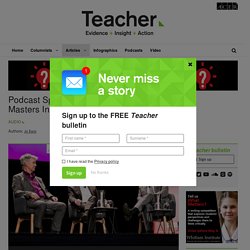
The team’s on the road this week at the ACER Research Conference in Sydney, where the theme for 2018 is ‘Teaching practices that make a difference: Insights from research’. In this special episode, we share highlights from the ‘In Conversation’ session on evidence-based teaching practices between Laureate Professor John Hattie and ACER CEO Professor Geoff Masters AO. The facilitator was Tony Mackay AM, of the Centre for Strategic Education in Melbourne, and his first question was where Australia sits in the international educational landscape. Geoff Masters began by pointing out, we know that what really matters in the end is what teachers do in their classrooms. … So, I’m not a great fan of looking overseas. I’m not a great fan that we go outside. GM: Can we understand what the reasons for that are and what might we do about it? People are running around interpreting progressions differently. GM: Okay. 60-Second Strategy: Interview Assessments.
Bining samples of student work with rubrics. With 20 blank faces staring back at me, it was clear that no formative assessment was required.
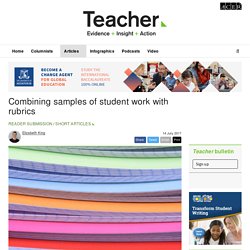
We had definitely not met the success criteria for this session: ‘To understand the features of an effective poetry recital and the criteria set out in the poetry recital rubric.’ After painstakingly working through the criterion on the rubric, discussing what each might look like and clarifying unfamiliar words, my students were no clearer about the expectations of the poetry recital assessment. I, like many other teachers, thought that rubrics clearly articulated the expectations of assessments and would naturally promote achievement. However, there is little empirical evidence to support this intuitive belief (Andrade, Du, & Wang, 2008) and the bewildered faces staring back at me certainly did not add any anecdotal weight to the argument either.
Assessment in context-based teaching and learning. The issue of assessment is critical in a context-based teaching approach.
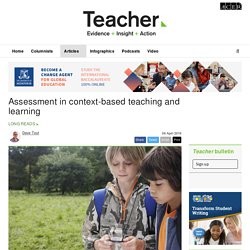
Consistent and effective methods of assessing the knowledge of learners is crucial to student engagement and improved learning outcomes. Good assessment practices allow teachers to better understand individual strengths and weaknesses, how to set goals and targets for learners, where to direct attention, resources and expertise, and how to adapt teaching practice to achieve greater student success. Planning the assessment(s) At the planning stage it is vital to make decisions about when and how students will be assessed and evidence of performance collected. In an applied, investigative, context-based approach, much of the learning and achievement of outcomes occurs during the process of undertaking the task set for the learner. Tips for a successful parent-teacher conference. ORANGE COUNTY, Fla. - October is here and with it comes cooler temperatures, Halloween and parent -teacher conferences.
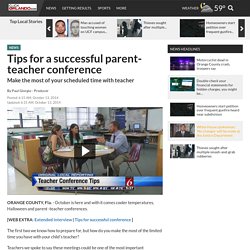
[WEB EXTRA: Extended interview | Tips for successful conference ] The first two we know how to prepare for, but how do you make the most of the limited time you have with your child's teacher? Teachers we spoke to say these meetings could be one of the most important conversations you will have all year about your child. Making Student Data Part of the Conversation. When Cole Young became the principal of Humboldt Elementary School 12 years ago, the school was only 300ths of a point away from being labeled under-performing. Young, who had previously been a teacher at Humboldt, knew that they needed to enact change -- and they needed to do it quickly.
Young, who says he'd "been a numbers guy for a long time," began aggregating all kinds of data, pushing it out to the teachers and staff, and exploring the role it could play in helping the school turn the tables on its under-performing label. Twelve years later, the result is a school that uses data in myriad ways and is truly data driven. Creating A Data-Friendly Culture In moving Humboldt Elementary to a more data-driven model, one of the first challenges that former principal Cole Young faced was figuring out how to use the data, how to share it, and how to get everyone on the same page with the numbers.
Insight Assessment Portal. Assessment & Reporting — Eltham North Primary School. The Reading Benchmarking Data is collected in mid-November each year.
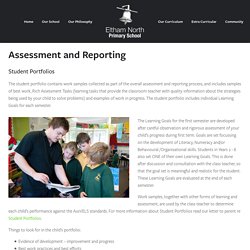
Our Reading Recovery Teacher completes the ‘running records’ for each student in Prep, Year 1 and Year 2 against the required Benchmark texts. Assessment and Reporting. Monitoring student growth. [Image ©Shutterstock/ michaeljung] In most areas of learning, growth occurs over extended periods of time.
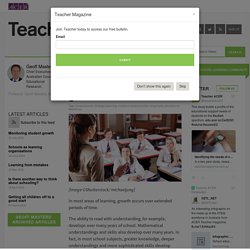
The ability to read with understanding, for example, develops over many years of school. Mathematical understandings and skills also develop over many years. In fact, in most school subjects, greater knowledge, deeper understandings and more sophisticated skills develop throughout the school years. Assessment & Reporting. Rationale: St Mary’s staff believe that Assessment and Reporting are integral to planned approaches to Learning and Teaching.
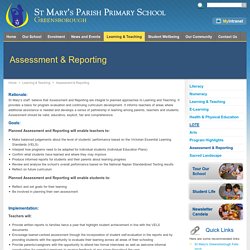
It provides a basis for program evaluation and continuing curriculum development. It informs teachers of areas where additional assistance is needed and develops a sense of partnership in learning among parents, teachers and students. Assessment should be valid, educative, explicit, fair and comprehensive. Goals: Assessment Tools. These tools are for immediate use with students in the classroom.
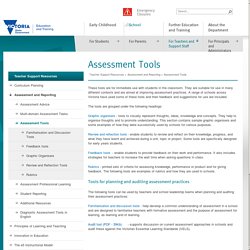
They are suitable for use in many different contexts and are aimed at improving assessment practices. Making Students Partners in Data-Driven Approaches to Learning. The following excerpt is from “Leaders of Their Own Learning: Transforming Schools Through Student-Engaged Assessment,” by Ron Berger, Leah Rugen, and Libby Woodfin.
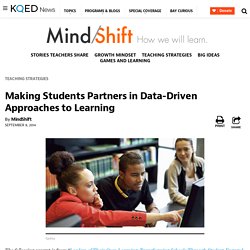
This excerpt is from the chapter entitled “Using Data With Students.” At Genesee Community Charter School in Rochester, New York, third-grade teacher Jean Hurst leans in and listens intently as her student, Jacelyn, reads aloud. Hurst is listening for greater fluency in Jacelyn’s oral reading, a skill they have been working on for several weeks. As she listens, she hears greater cadence and confidence in Jacelyn’s voice. Hurst is careful to note miscues and the length of time it takes Jacelyn to read the passage. Hurst and Jacelyn discuss how her substitution enabled her to make sense of what she was reading without slowing down her overall rate. Students Unpack a Learning Target. Building Foundations for Life. Purpose of Assesment at Immanuel The main aim of assessment at Immanuel Primary School is to provide feedback on the learning process and the development of the five essential elements to inform further learning.
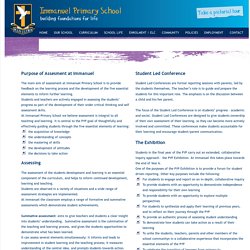
Students and teachers are actively engaged in assessing the students’ progress as part of the development of their wider critical thinking and self assessment skills. At Immanuel Primary School we believe assessment is integral to all teaching and learning. 10 Assessments You Can Perform In 90 Seconds. 10 Assessments You Can Perform In 90 Seconds by TeachThought Staff Good assessment is frequent assessment. Any assessment is designed to provide a snapshot of student understand—the more snapshots, the more complete the full picture of knowledge.
On its best day, an assessment will be 100% effective, telling you exactly what a student understands. More commonly, the return will be significantly lower as the wording of questions, the student’s sense of self-efficacy, or other factors diminish their assessment performance. This makes a strong argument for frequent assessment, as it can be too easy to over-react and “remediate” students who may be banging against the limits of the assessment’s design rather than their own understanding. It is a huge burden (for both teachers and students) to design, write, complete, grade, and absorb the data into an instructional design sequence on a consistent basis.
Simple Assessments. How To Make Lesson Objectives Clear To Students. Dial Up Your Formative Assessment Technique. In my role as assessment coach and consultant, I have had many conversations about the differences between formative assessment as a form of testing, and formative assessment strategies that become part of instructional pedagogy. A common misconception among educators is the use of formative assessment as a noun, when in fact the research frames formative assessment as a verb.
Capturing the strategies that move learning forward can be tricky, but Teaching Channel has some great examples of practical ways that teachers can implement formative assessment. In his book Embedded Formative Assessment, Dylan Wiliam reminds us that, “The shorter the time interval between eliciting the evidence and using it to improve instruction, the bigger the likely impact on learning.” 5 Templates to Use for Self-Directed Learning Projects.
I’ve written man article about self-directed learning over the last couple of years, and more people are inquiring about simple steps to get started.
Search. Cybraryman Internet Catalogue. My Goal Mavens @coolcatteacher@angelamaiers@wmchamberlain. Your Back-To-School Backpack: Support For The New School Year. Welcome to Teaching Channel’s very own Back-To-School Backpack. What Is Formative Teaching As It Relates To Learning? Formative Assessment Practices To Support Student Learning. 10 ways to encourage student reflection… Split Screen Teaching Optimal learning occurs when students are active participants in their own learning, rather than passive recipients of teacher-delivered content. Reflecting on and refining assessment tasks. It’s important educators understand where students are in their learning, and there are lots of ways to monitor this progress that can inform meaningful feedback and next steps. One example is an end of semester or end of unit assignment or portfolio task developed by the subject or classroom teacher. If you’ve designed one of these tasks, think about the process you undertook.
Formative Assessment Tools & Resources. Teaching Strategy of the Week. Strengthening Lessons With A Student Work Protocol. As the chill in the air gets chillier, and your stacks of student work pile up like fallen leaves, why not pause, take a breath, and take a moment to look at that student work in a new way. Sure, you need to look at the work to assess student progress, provide feedback, and celebrate student successes, but you can also use it to assess, refine, and celebrate your own work. Teachingchannel. Teachingchannel. Teachingchannel. Edutopia finley 53 ways to check understanding 2016. Edutopia. Edutopia. Developing your assessment skills. Rethinking formative and summative assessment. Focusing on ownership of learning… Hacking Feedback. Hacking Feedback: Strategies and Tools. Edutopia. Tch Back-To-School-Backpack: Assessment.
Success criteria and rubrics. Your Back-To-School Backpack. News. Internet Catalogue. 3 The task. 60 Things Students Can Create To Demonstrate What They Know. 7 Key Characteristics Of Better Learning Feedback. Purely Paperless: Reading and Writing Conferences Made Easy with Confer. The Student Assessment Tools Collection by Rick Thomas. Rubric. Formative Assessments Are Easier Than You Think! The Power of the Formative Assessment. Exit Slips. The Best Resources For Learning About Formative Assessment.
Metacognition. 3 The task. Use Seesaw To Create A Learning Journal In Your Classroom. Reporting and Assessment — Doncaster Primary School. Praise The Process Build A Growth Mindset. AC History Units. 5 Reasons You Should Seek Your OWN Student Feedback.